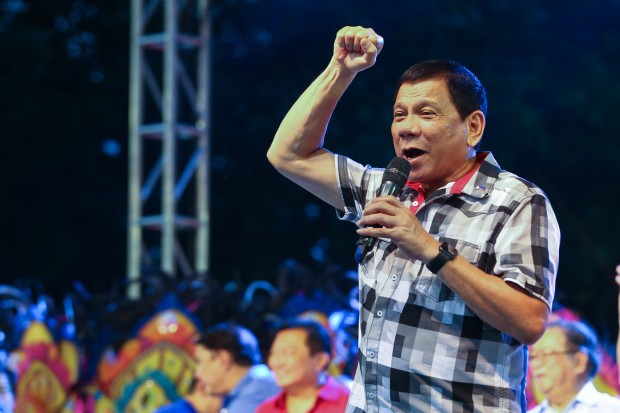In the morning of Aug. 23, 2010, as then President Benigno Aquino III began his 55th day in office, a dismissed Manila policeman in uniform took control of a tourist bus filled with visitors from Hong Kong. Holding the terrified passengers at gunpoint at a parking bay in Luneta Park, Rolando Mendoza claimed he had been a victim of injustice. Through notes scribbled on cardboard, he demanded immediate reinstatement to his former position.
The Luneta incident was badly mishandled. It ended gruesomely, and quickly became an emblem of government incompetence and indecisiveness. It defined Aquino’s first 100 days as president.
To recall this unfortunate tragedy is to grasp the full measure of President Duterte’s first 100 days in office. It is a record that, in an uncanny way, is also soaked in blood. But, the blood belongs to suspected drug users and traffickers, not to innocent tourists. There is no doubt how Mr. Duterte would have dealt with the Luneta hostage-taker. He would have killed him himself.
In his inaugural speech, Mr. Duterte said that at the root of the country’s problem with drugs, criminality, and corruption was a more serious condition. He described it as “the erosion of the people’s trust in our country’s leaders; the erosion of the faith in our judicial system; the erosion of confidence in the capacity of our public servants to make the people’s lives better, safer and healthier.”
Verging on the illegal
Acknowledging that his methods are often seen as “unorthodox” and “verg[ing] on the illegal,” he asked that his presidency be allowed “a level of governance that is consistent to our mandate.” He said that “the fight will be relentless and it will be sustained.”
Indeed, more than anything else that has been done under this administration, it is the wanton killings in the war on drugs that the public easily associates with the first 100 days of the Duterte presidency. During this brief period, the police have chalked up 1,375 killings resulting from what they call “legitimate police operations.” More than 2,000 other murders, mostly from poor communities, have been ascribed to vigilante-style killers.
But, there is another view. In a special report published the other day, the British newspaper The Guardian recounts its interview with an unnamed police officer who talks of the existence of 10 parallel police teams consisting of 16 members each that have been secretly carrying out vigilante-style killings. The report may be accessed here: https://www.theguardian.com/world/2016/oct/04/philippines-secret-death-squads-police-officer-teams-behind-killings.
The head of the Philippine National Police claims that, as a result of ‘Oplan Tokhang,’ more than 665,518 confessed drug addicts and 53,311 pushers have turned themselves in for rehabilitation. These are astonishing numbers. At no other time have so many ordinary people voluntarily come forward to seek help for their drug addiction. These numbers compel any government to respond with a comprehensive strategy that confronts the menace of drugs as a public health issue.
When Mr. Duterte began his campaign for the presidency, warning about the drug problem and offering himself as the nation’s last hope to end it, people were mesmerized by his tough language. But one wonders if his audiences took his urgent depiction of the drug problem seriously. What made him an overnight political sensation was his powerful presence on the stage, his irreverence, and his insult-driven way of talking. To them, he was the antithesis of the nation’s phlegmatic political elite. He could have espoused any cause, and it would not have made any difference to them.
Consistent with the image he projects as the personification of a strong state, Mr. Duterte quickly found another area in which he could articulate his message of recuperation of the nation’s will and pride: foreign policy. “We are no longer anyone’s lackey,” he tells his audiences. Over the last three months he has directed his harshest tirades against US President Barack Obama, UN Secretary General Ban Ki-moon, the European Union, and various human rights groups that have called him out on the abuses being committed by his war on drugs.
Personal pivot
In these speeches, he has called for the withdrawal of the remaining US special forces in Mindanao, the termination of Philippine participation in joint US naval patrols of the South China Sea, the suspension of US-PH joint military exercises, and a review of all mutual defense agreements with its most important treaty ally, the United States. While heaping scorn on the country’s old friends, he has signaled his own personal pivot to China and Russia.
Top defense and foreign affairs officials say that none of these statements have ripened into policy. Evidently, none of these have been the subject of deliberation in Cabinet meetings. This appears to be the hallmark of Dutertismo: an unrestrained chief executive pronounces himself on a wide range of sensitive issues prior to any careful study by the concerned institutions of government.
Totally overshadowed by their principal, members of the Duterte Cabinet quietly plod on—building upon the work done by the previous administration and desperately looking for enduring solutions to recalcitrant problems. They are the same problems: mass poverty, unemployment and underemployment, lack of housing for the poor, inadequate health services, Metro Manila traffic, congested airport runways, unreliable mass transport system, unreleased vehicle plate numbers, etc.
Fear of a President
But, what Dutertismo has sown in the last 100 days is fear—fear of being killed, fear of a President who does not hesitate to name and shame, or publicly threaten anyone. Fear may whip the bureaucracy into line, curb corruption in the short term, and reduce crime. But, on the negative side, fear induces people to withhold feedback, and feedback is what any system needs to improve itself.
Mr. Duterte came to power with the promise to quickly relieve the nation of its urgent problems. His preferred methods ignore the complexity of these pains. Rather than fix troubles, they give rise to bigger problems. Ironically, addicts turn to shabu for the same reason—to escape a difficult life they cannot comprehend.
